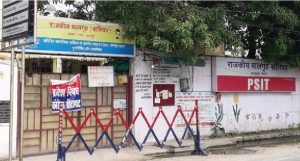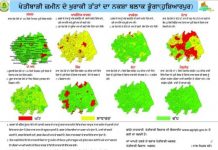 The shocking outburst of Covid-19 in a Kanpur-based Government Protection Home, infecting 57 minor inmates out of 63 under the Protection of Children from Sexual Offences (Pocso) Act, could be averted had the Uttar Pradesh government properly implemented the apex court’s directives issued in the beginning of April 2020 to check contagion of the virus in children protection homes. All the responsible authorities utterly failed to carry out these elaborative directionssafeguarding the interests of victim inmates of sexual violence, rape and others conflict with law under its protective care. Most of them are of unsound mental health and need personal care and attention.
The shocking outburst of Covid-19 in a Kanpur-based Government Protection Home, infecting 57 minor inmates out of 63 under the Protection of Children from Sexual Offences (Pocso) Act, could be averted had the Uttar Pradesh government properly implemented the apex court’s directives issued in the beginning of April 2020 to check contagion of the virus in children protection homes. All the responsible authorities utterly failed to carry out these elaborative directionssafeguarding the interests of victim inmates of sexual violence, rape and others conflict with law under its protective care. Most of them are of unsound mental health and need personal care and attention.
Soon after the pandemic of Covid-19 outbreak, a bench of Supreme Court comprising Justice L Nageshwar Rao and Justice Deepak Gupta took suo moto cognizance of the under-care children kept in the protection home on April 3 and issued detailed orders to insulate them from the clutches of infection of coronavirus. But despite these specific directivesand action plan given to all the state governments including the Uttar Pradesh Government, Child Welfare Committees, Juvenile Justice Boards and Children Courts, Child Care Institutions and weekly monitoring from various High Courts, it could not recue them from getting infected with Covid-19.
The shocking revelations surfaced when news flashed about them that out of 63 total inmates under POCSO Act, 57 have been tested Covid-19 positive. Two of the seven of them are carrying advanced stage of pregnancy including five tested Covid-19 positive. One pregnant minor tested HIV positive also and another suffering from Hepatitis-C. A woman in the government shelter home had tested positive for Covid-19 on June 15, following which a few more tests were conducted. On June 18, the test results found 33 more girls positive for the virus. Twenty-eight more girls in the shelter home tested positive over the next two days.
The National Human Rights Commission (NHRC) India has taken suo moto cognizance of media reports that fifty-seven minor girls have tested positive for the novel coronavirus at a state-run children’s Shelter Home in Kanpur district of Uttar Pradesh. Five of them have been found pregnant and one HIV positive. Reportedly, the girls were exhibiting symptoms of COVID 19 for some time but there was delay in taking them to the hospital for tests.
The Commission has observed that the contents of the media report, if true, are enough to prima facie believe that the public servants have failed to provide safeguard to the victim girls and, apparently, were negligent in protecting their right to life, liberty and dignity in the custody of the State.
In a notice to the UP Chief Secretary calling for a detailed report in the matter including health status of all the girls, their medical treatment and counselling provided to the girls by the authorities. The State Government is expected to order an inquiry into the matter from
an independent agency. It is also expected to review health status of the female inmates lodged in shelter homes, across the State and issue suitable directives that such incidents do not recur in future.
The District Magistrate Kanpur city Dr Brahm Dev Tiwari maintained that the pregnant girls were brought to Swaroop Nagar Government Shelter Homefrom Kanpur and neighbouring districts including Kannauj, Etah, Firozabad and Agra and admitted in this shelter home onthe directive of the child welfare committees of the respective districts. “The samples of all the 171 inmates and 26 employees by now have been tested for Covid-19. The exercise begun when the initial symptoms of the disease were noticed in them. Fifty-seven inmates and one staff member found positive,” he added.
The District Probation Officer Ajit Kumar told that the pregnant minor girls have been hospitalised in Maternity Ward for Covid-19 patients in the Women Hospital whereas other infected inmates have been admitted in quarantine facilities for treatment in isolation ward. The protection home has been closed for proper sanitisation and a Sub Divisional Magistrate would conduct a probe into the matter.
Such violations haunt the nation and particularly its politicians with the horrific infamous incidents of Bihar’s Muzzafarpur and Uttar Pradesh’s Deoria who become apprehensive of its repeat. These unfortunate incidents carries bad memories of sex racket and human trafficking that hurt the conscience of the Nation and judiciary have to step in to ensure fair investigation to see the real culprits are booked to justice.
In Bihar’s Muzaffarpur case 44 girls were rescued from a shelter home after it was found out that they were being abused by the owner of the NGO, Brajesh Thakur who was raping the minors along with many of his accomplices.In Deoria district, 24 girls had been rescued from Ma Vindhywasini Shelter Home on August 6, 2018 after found to be allegedly involved in human trafficking. UP Police arrested one GirijaTripathi and Mohan Tripathi in this high profile case.
This incident allowed all-round attack on Yogi Adityanath headed BJP government by opposition parties. Congress leader Priyanka Gandhi Vadra and Samajwadi Party chief Akhilesh Yadav attacked the BJP government in Uttar Pradesh over the media reports about the girls being found pregnant at the shelter home.
“The entire story of the Muzaffarpur shelter home case is in front of the country. Such a case had also come to light in Deoria in UP,”Priyanka Gandhi said.“In this scenario, such an incident again coming out shows that everything is suppressed in the name of investigations, but very inhuman incidents are taking place in government child protection homes,” she contended.
The BSP also demandeda high-level fair investigation totake strict action against the culprits. In a series of tweets Mayawati expected that the UP government will not cover up the incident of Kanpur Girl Child Protection Home and work for bring necessary humanitarian reform in the system of girls.“The news of Corona infection in the protection home naturally caused concern and sensation which proves that UP government has been indifferent, careless and irresponsible in the matters of women security,”she remarked.
Akhilesh Yadav tweeted, “Resentment prevails in the masses of Uttar Pradesh after the news from the Government Child Protection Home of Kanpur. There has been serious exposuresrocked the people where some minor girls reported pregnant. Of these, 57 have been found to be affected by corona and one with AIDS, they should be treated immediately.”
“The government should immediately investigate against those who were physically abused,” he demanded.
While demanding adequate compensation to victims girls of protection home activist Dr Nutan Thakur urged the National Human Rights Commission to institute high level enquiry to fix the accountability of the delinquent officers. In her complaint she cited the directions of the Supreme Court in its order dated 03 April 2020 in suo moto Writ Petition No 4 of 2020 with regard to various aspects to be followed to protect the children from Covid-19. She alleged that these directions were not followed in Kanpur shelter home.
In a conversation with Tehelka, Nutan alleged that the maximum capacity of Kanpur shelter home was 100 but it kept 171 girls there along with 26 staff members, which was much higher than its capacity. In addition, appropriate precautions as directed by apex court were not adhered to in respect of these 07 pregnant girls and thus they must be duly compensated for the inaction on the part of state authorities.
Uttar Pradesh Women Commission also swung into damage control mode. One of its members Poonam Kapoor who is resident and incharge of Kanpur quickly visited Girls Protection Home and Lala Lajpat Rai Hospital/GSVM Medical College to take stock of controversy erupted about their pregnancy and outburst of covid-19 among inmates of protection home.
Poonam refuted the media reports that these inmates become pregnant during their stay in the protection home. She said we counselled them a lot for going to abort child but she continued with it saying that, “they are just spending their days to turn major so that they walk free and have their partners released from jails.”
“The inmates were also taken for medical examination at regular intervals at government hospitals and from there they could bring infection. However, we are tracking the source,” she explained.”
The Supreme Court of India has frequently handled the cases of minor rape victims who unwantedly carrying the pregnancy with utmost care and sympathy. In the matter of Suchita Srivastava and another vs. Chandigarh Administration reported in (2009)9 SCC 1, the apex court evolved doctrine of “parens patriae” in common law remedy in situations where the State must make decisions in order to protect the interests of those persons who are unable to take care of themselves. The minor inmates of protection homes fall in this category.
“Traditionally this doctrine has been applied in cases involving the rights of minors and those persons who have been found to be mentally incapable of making informed decisions for themselves.” But such lawful recourse of lawful termination of the pregnancy of minor rape victims under POCSO Act stood lost for these inmates of Kanpur due to lack of counselling efforts as such stage had crossed during their stay in the protection home.
THE MAJOR HIGHLIGHTS OF SUPREME COURT ORDERS
Taking suo moto cognizance of the issue involving protection of children who fall within the ambit of Juvenile Justice (Care and Protection of Children) Act, 2015 from the spread of Coronavirus that is sweeping the world, the bench of justice L. NageswaraRao and Justice Deepak Gupta, issued extensive directions to various authorities.
DIRECTIONS TO CHILD WELFARE COMMITTEES
◆ Ensure whether a child or children should be kept in the CCI considering the best interest, health and safety concerns.
◆ Special online sittings or video sessions may be called to consider measures that may be taken to prevent children residing in the Children’s Homes, SAAs, and Open Shelters from risk of harm arising out of COVID¬ 19.
◆ Gatekeeping or preventive measures need to be considered and families counselled to ensure that institutionalization is the last resort.
◆ online help desks and support systems for queries to be established at the state level for children and staff in CCIs.
◆ violence, including sexual and gender¬ based violence may be exacerbated in contexts of anxiety and stress produced by lockdown and fear of the disease, CWCs can monitor regularly through video conferencing, Whatsapp and telephonically to ensure prevention of all forms of violence.
DIRECTIONS TO JUVENILE JUSTICE BOARDS AND CHILDREN COURTS
◆ Measures to be taken to prevent children residing in Observation Homes, Special Homes and Places of Safety from risk of harm arising out of COVID¬ 19.
◆ Steps to be taken to release all children alleged to be in conflict with law on bail, unless there are clear and valid reasons for the application of the proviso to Section 12, JJ Act, 2015
◆ Video conferencing or online sittings can be held to prevent contact for speedy disposal of cases.
◆ Ensure that counselling services are provided for all children in Observation homes.
DIRECTION TO GOVERNMENTS
◆ Develop a system for how to organise trained volunteers who could step in to care for children, when the need arises.
◆ Make provisions to ensure that counselling is made available, and that there are monitoring systems in place to prevent violence, abuse, and neglect, including gender¬based violence, which may be exacerbated in contexts of stress produced by lockdown.
◆ Ensure adequate budgetary allocation is made to meet the costs that are likely to arise for the effective management of the pandemic, and that all bottlenecks and procedural delays ar effectively curbed.
◆ Ensure adequate availability of good quality face masks, soap, disinfectants such as bleach, or alcohol ¬based disinfectants, etc.
◆ Ensure availability of adequate food, drinking water, and other necessities such as clean clothes, menstrual hygiene products, etc.
DIRECTIONS TO CCIs
◆ The Health Ministry has set up new National Helpline on COVID¬19, which are 1075 and 1800¬112¬545. In case of any queries or clarifications related to Coronavirus pandemic, call on this number. In addition, Childline 1098 continues to be operational.
◆ Staff or any other individual found to be exhibiting symptoms of COVID¬19 should not be permitted to enter the CCI.
◆ Enforce regular hand washing with safe water and soap, alcohol rub/hand sanitizer or chlorine solution and, at a minimum, daily disinfection and cleaning of various surfaces including the kitchen and bathrooms. Where adequate water is not available, immediate steps should be taken to ensure it is made available through necessary action, including enhancing budget allocation for the said purpose.
◆ Provide appropriate water, sanitation, disinfection, and waste management facilities and follow environmental cleaning and decontamination procedures.
DIRECTIONS FOR CHILDREN UNDER FOSTER AND KINDSHIP CARE
◆ Families that are fostering children should receive information about how to prevent COVID¬19 as indicated above.
◆ Follow up should be made on their health and psychosocial well¬being status, and they should be informed of how to do in case of symptoms.
PREVENTIVE MEASURES
◆ Spread awareness
◆ Take necessary steps to practice, promote and demonstrate positive hygiene behaviours and monitor their uptake
◆ Practice social distancing
◆ Cleaning and disinfecting rigorously
RESPONSIVE MEASURES
◆ Conduct regular screening
◆ follow procedures established by the Ministry/Department of Health and Family Welfare, if children or staff or other service providers working in the CCI become unwell.
◆ CCI should have a quarantine/segregated section (where possible) & make alternate arrangements where a quarantine facility is not possible.
◆ plan ahead with the local health authorities to plan for any emergency that may arise due to the COVID¬19
Apart from the above mentioned directions, laid down certain directions to ensure the general wellbeing of children during the Coronavirus spread.
letters@tehelka.com












